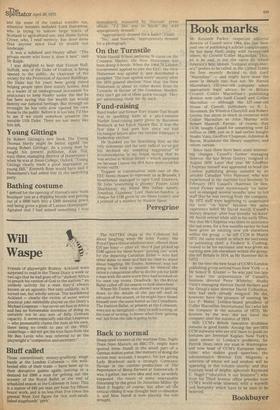Book marks
Mr Kenneth Parker, respected editorial director of Cassell since 1964, has just been paid one of publishing's subtler compliments.
He has been fired, along with twenty-odd others, by Crowell Collier Macmillan. That, let it be said, is not the name by which America's best known "cultural conglomeracy" prefers to be called: in the United States the firm recently decided to dub itself "Macmillan" — and might have done the same in Britain too, had not Mr Harold Macmillan's 132-year-old company taken appropriate legal advice. So in Britain Crowell Collier Macmillan's publishing division now calls itself Cassell and Collier Macmillan — although the 127-year-old House of Cassell, publishers to R. L.
Stevenson, Sir Winston Churchill and Robert Graves, has about as much in common with Collier Macmillan as John Murray with Robert Maxwell. Except, of course, that CCM. bought Cassell for something over £2 million in 1969, just as it had earlier bought Studio Vista, Geoffrey Chapman, Johnston & Bacon, Woolstons the library suppliers, and others various.
Since then there have been some interesting changes. Cassell's former managing director, the late Bryen Gentry, resigned in August 1970. Later that year Mr Geoffrey Chapman himself was appointed to head the London publishing group, assisted by an amiable Canadian Vern Hammer, who was experienced in the machine tool business. In February 1971 Cassell's chairman Dr Des mond Flower went mysteriously 'on leave' and re-emerged several months later to tell staff that he was retiring from the company. By 1972 staff were beginning to understand the term 'on leave' because the same experience befell Mr David Ascoli, Cassell's literary director: after four months 'on leave' Mr Ascoli retired while still in his early fiftes.
Not that Mr Chapman was there to announce the sad news, for a few months earlier he had been given an exciting new job elsewhere within the group — he left CCM in March 1973, the same month in which his successor as publishing chief, a Frederic S. Cushing, ceased to be his successor and was given an exciting new job elsewhere within the group. (He left Britain in 1974, as Mr Hammer did in 1973).
By the time the new head of CCM's London publishing group arrived from New York — a Mr Sidney B. Kramer — he was just too late to make the acquaintance of Cassell's business director Peter Whiteley, Studio Vista's managing director David Herbert and the Group's sales director David Collischon, who had each already resigned. He did, however, have the pleasure of meeting Mr Leo P. Mabel, London-based president of Collier Macmillan International Inc (who left the company in the autumn of 1973). Mr Kramer, by the way, did not leave the company until the autumn of 1974.
Still, CCM's British operation doubtless remains in good hands. Among the pre-1970 CCM stalwarts who are still there to guide its fortunes are Jeremiah Kaplan. New York's latest answer to London's problems; Sir Patrick Dean, once our man in Washington and now head of CCM's European operations, who makes good speeches; the administrative director Eric Magness, a selection of whose wit and wisdom will be appearing in this column shortly; and that fountain head of delphic aphorism Raymond C. Hagel ("education is our business") who from his Third Avenue office presides over CCM's world-wide interests with a warmth and humanity which have to be seen to be believed.
Bookbuyer










































 Previous page
Previous page